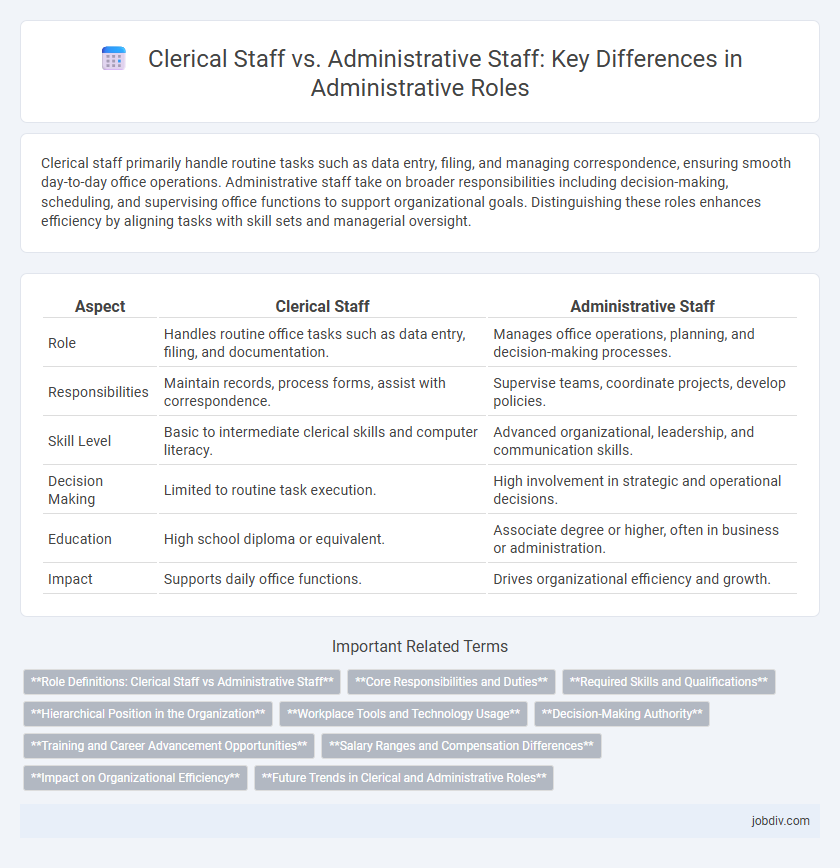Clerical staff primarily handle routine tasks such as data entry, filing, and managing correspondence, ensuring smooth day-to-day office operations. Administrative staff take on broader responsibilities including decision-making, scheduling, and supervising office functions to support organizational goals. Distinguishing these roles enhances efficiency by aligning tasks with skill sets and managerial oversight.
Table of Comparison
| Aspect | Clerical Staff | Administrative Staff |
|---|---|---|
| Role | Handles routine office tasks such as data entry, filing, and documentation. | Manages office operations, planning, and decision-making processes. |
| Responsibilities | Maintain records, process forms, assist with correspondence. | Supervise teams, coordinate projects, develop policies. |
| Skill Level | Basic to intermediate clerical skills and computer literacy. | Advanced organizational, leadership, and communication skills. |
| Decision Making | Limited to routine task execution. | High involvement in strategic and operational decisions. |
| Education | High school diploma or equivalent. | Associate degree or higher, often in business or administration. |
| Impact | Supports daily office functions. | Drives organizational efficiency and growth. |
Role Definitions: Clerical Staff vs Administrative Staff
Clerical staff primarily handle routine office tasks including data entry, filing, and record maintenance, ensuring smooth day-to-day operations. Administrative staff undertake broader responsibilities such as managing office functions, coordinating departments, and supporting senior management with strategic initiatives. Clear role definitions distinguish clerical duties as operational support, while administrative roles encompass managerial and organizational oversight.
Core Responsibilities and Duties
Clerical staff primarily handle routine tasks such as data entry, filing, scheduling, and basic correspondence to support daily office functions. Administrative staff are responsible for higher-level duties including managing office operations, coordinating projects, overseeing budgets, and facilitating communication between departments. Both roles ensure organizational efficiency, but administrative staff typically engage in strategic planning and decision-making processes.
Required Skills and Qualifications
Clerical staff typically require proficiency in office software, data entry accuracy, and strong organizational skills, often supported by a high school diploma or equivalent. Administrative staff demand advanced qualifications including project management expertise, leadership abilities, and excellent communication skills, usually backed by a bachelor's degree or higher. Both roles benefit from time management, problem-solving capabilities, and familiarity with office technology, but administrative staff are expected to handle complex decision-making and strategic planning tasks.
Hierarchical Position in the Organization
Clerical staff typically occupy entry-level positions within an organization, supporting daily operational tasks such as data entry, filing, and scheduling. Administrative staff hold higher hierarchical roles, often managing departments, overseeing clerical functions, and coordinating executive activities. The distinction in hierarchical position influences responsibility scope, decision-making authority, and involvement in organizational strategy.
Workplace Tools and Technology Usage
Clerical staff primarily utilize office software such as word processors, spreadsheets, and data entry systems to handle routine tasks like filing, scheduling, and record-keeping. Administrative staff engage with more advanced technology, including project management platforms, enterprise resource planning (ERP) systems, and communication tools to coordinate operations and support decision-making processes. The distinction in tool usage reflects the difference in responsibility levels and complexity of tasks between clerical and administrative roles.
Decision-Making Authority
Clerical staff typically handle routine tasks such as data entry, scheduling, and document management with limited decision-making authority focused on operational support. Administrative staff possess broader decision-making power, managing office functions, executing company policies, and often coordinating between departments for strategic initiatives. The level of autonomy and responsibility in administrative roles significantly surpasses that of clerical positions, impacting overall organizational efficiency and workflow.
Training and Career Advancement Opportunities
Clerical staff typically undergoes basic training focused on routine administrative tasks such as data entry, filing, and customer service, with limited immediate opportunities for career advancement. Administrative staff receives more comprehensive training, including project management, decision-making, and leadership skills, enabling progression into higher managerial roles. Organizations that invest in continuous professional development programs for administrative employees often experience enhanced operational efficiency and employee retention.
Salary Ranges and Compensation Differences
Clerical staff typically earn salaries ranging from $28,000 to $45,000 annually, reflecting entry-level to mid-tier administrative duties such as data entry and basic office support. Administrative staff salaries average between $40,000 and $65,000, driven by higher responsibilities including project coordination, budget management, and supervisory roles. Compensation packages for administrative staff often include bonuses, health benefits, and professional development opportunities, which are less prevalent for clerical positions.
Impact on Organizational Efficiency
Clerical staff streamline routine tasks such as data entry, filing, and scheduling, ensuring operational workflows remain efficient and error-free. Administrative staff oversee strategic planning, resource allocation, and interdepartmental coordination, driving organizational goals and enhancing overall productivity. The combined effectiveness of clerical and administrative roles directly correlates with improved decision-making speed and minimized operational disruptions.
Future Trends in Clerical and Administrative Roles
Future trends in clerical and administrative roles emphasize increased automation and the integration of artificial intelligence tools, which streamline routine tasks and enhance data management accuracy. The growing demand for digital literacy and advanced communication skills highlights the shift towards more strategic support functions within organizations. Roles are evolving to require proficiency in collaborative technologies and decision-making support, positioning administrative staff as key contributors to organizational efficiency and innovation.
Clerical Staff vs Administrative Staff Infographic

 jobdiv.com
jobdiv.com